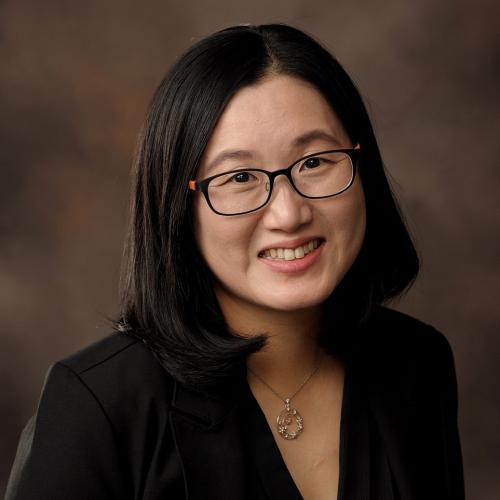Each year, the Informatics Program's Champaign-Urbana Community Fab Lab hosts thousands of diverse visitors, prompting makers, educators, and researchers across campus and local communities to collaborate as they share the vision of inspiring creativity and discovery through dynamic learning.
In spring 2022, Associate Professor Kyungwon Koh was appointed as Fab Lab director, following realignment of the lab with the iSchool in 2019. Koh has studied library makerspaces since the contemporary maker movement began to emerge in U.S. libraries around 2012. She has received several federal research grants on makerspaces (nearly $1.5 million) and conducted research on different types of makerspaces in schools, libraries, and higher education across the country.
Under Koh's leadership, a five-year strategic plan for the Fab Lab has been created. The goals include advancing research in makerspace and design thinking; offering robust and accessible education for makerspace professionals; promoting sustainable community building and engagement through making and design; and providing access for all in a safe and welcoming environment. These efforts advance the University's research, teaching, and engagement mission, enhancing the lives of citizens.
Research
The Fab Lab's research strengths include library, educational, and community makerspaces. Recent accomplishments include a nearly half-million-dollar, three-year National Leadership Grant from the Institute of Museum and Library Services (IMLS grant LG-252360-OLS-22). The funding supports investigators Assistant Professor JooYoung Seo and Koh in creating maker programs that promote computational thinking for blind and visually impaired teens and in developing training materials on accessible making for librarians and maker professionals.
"For blind and low-vision learners, tangible and hands-on learning experience is critical," Seo said.
Associate Professor Ryan Cordell's book art lab, Skeuomorph Press, is housed in the Fab Lab. The historical media and technology allow people to gain historical insight and innovate for the future. Cordell and Koh recently received a research support award from the Campus Research Board to survey humanities maker labs across the country, which will help position the University as a leader in the national conversation around critical making in humanities.
Koh's plans also include creating a Fab Lab Research Network. The network will help develop a focused research portfolio around makerspaces with unique characteristics, create a space for makerspace researchers to connect and collaborate, and advance knowledge in this important area.
Teaching
To enhance learning, the Fab Lab provides courses, independent studies, practicums, and hands-on opportunities through graduate assistantships, student hourly positions, and volunteer work. Koh and Emilie Butt, Fab Lab instruction and engagement coordinator, teach IS 582 Make, Design, and Learn in Libraries, a course that combines research, theory, and hands-on technology workshops.
The lab has been helpful in advancing the work of Teaching Assistant Professor Inkyung Choi and her independent study students in exploring the organization of multi-modal and dynamic information in makerspaces, which includes the diversity of technology tutorials and maker curriculums. Together, they developed a metadata scheme for the Fab Lab.
"At the Dublin Core Metadata Initiative (DCMI) 2022 conference, where scholars and practitioners in the metadata field present their work, my students' work in collaboration with Fab Lab was recognized as an innovative case study that supports the FAIR (findability, accessibility, interoperability, and reuse) principle for a broad audience and provides the potential to be transferable to the wider metadata, cataloging, and GLAM (galleries, libraries, archives, and museums) community," said Choi.
In addition, the Fab Lab welcomed two inaugural graduate assistants this fall. Both are earning their master's degrees in library and information science and working in joint community engagement and lab assistant positions.
"They are obtaining hands-on experience by designing and delivering maker programming, learning fabrication tools in the lab, and assisting the management of the lab, which are valuable skills for future librarians who focus on makerspaces, youth services, or community informatics," said Koh.
"My experience at the Fab Lab has been incredible," said Lily Schwarz, one of the graduate assistants. "Working in partner sites with kids of all ages has helped me to realize how dynamic learning can be. It has opened my eyes to how flexible information sciences is and how my degree can be used in the field."
Engagement
Community connections are a pillar of the Fab Lab. For the past summer and fall, the lab offered numerous community youth-oriented programs, partnering with eight organizations in Champaign County, including Urbana Neighborhood Connections Center (UNCC), The Urbana Free Library, Driven to Reach Excellence & Academic Achievement for Males (DREAAM) of Rantoul, Mattoon School District, Unit 4 Multilingual Learners Program, International Prep Academy (IPA), Urbana Park District, Urbana School District, and Booker T. Washington STEM Academy.
Under its five-year strategic plan, the Fab Lab will expand its impact to regional and statewide communities throughout Illinois, including accessible continuing education and professional development for current librarians and teachers.
"The Fab Lab is committed to creating an open, community-oriented, and capacity-building makerspace, fostering a dynamic experiential learning environment, and sparking interdisciplinary groundbreaking discoveries," said Koh. "Our lab is open to the public several days each week. Campus and community members can pursue their own projects, and staff members are available for assistance as needed."

